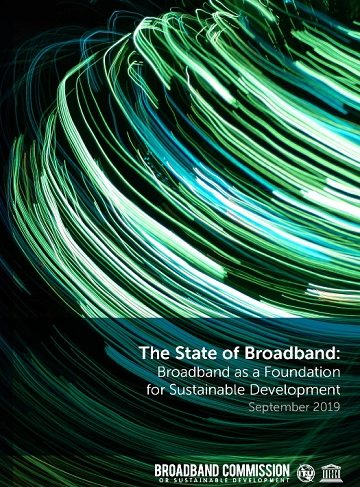
NEW YORK — As global Internet growth stalls, there is an urgent need for governments around the world to adopt new collaborative strategies “to drive the concept of ‘meaningful universal connectivity’ through greater emphasis on resource sharing and a more holistic approach that treats broadband as a basic public utility and vital enabler of global development,” says a new report from the UN-backed Broadband Commission for Sustainable Development.
Traditional approaches to driving Internet network roll-out and uptake are failing to reach the remaining half of the world’s population still lacking online access, according to The State of Broadband 2019: Broadband as Foundation for Sustainable Development, the latest report from the Broadband Commission for Sustainable Development, a joint initiative by the International Telecommunication Union (ITU) and UNESCO. The Broadband Commission released its report at its annual fall meeting held over the weekend at the Yale Club in New York, just ahead of the 73rd UN General Assembly.
The report reveals that global growth in the percentage of households connected to the Internet is slowing, rising only slightly to 54.8% from 53.1% last year. In low-income countries, household Internet adoption improved by a mere 0.8% on average, according to the report. Data on individuals using the Internet also indicated slowing global growth in 2018, as well as a slowing growth in developing countries, which are home to the vast majority of the estimated 3.7 billion people still unconnected.
The Broadband Commission’s notion of “meaningful universal connectivity” encompasses broadband technology that is available, accessible, relevant and affordable, but that is also safe, trusted, user-empowering and leads to positive impact. The Broadband Commission’s report advocates for this new concept to underpin policy makers’ digital strategies, as governments seek to find new ways to finance network roll-out and reach unconnected populations.
“Connecting the world’s population to the Internet is about collaboration, collective approaches and partnerships — among different stakeholders, across different sectors and across borders,” said Broadband Commission co-chair Carlos Slim, in a news release announcing the report’s findings. “It is about understanding the needs of people in terms of connectivity, literacy, access to content in different formats and languages, and services. It is about bringing the costs of services and devices down. And it is about empowering people who lack standard basic ICT skills with the means to participate in the digital ecosystem.”
According to the report, that while almost one billion new mobile subscribers have been added in the five years since 2013 (4.2% average annual growth), the speed of growth in mobile connections is also slowing, particularly at the bottom of the pyramid. Mobile network coverage improved much more slowly in low-income countries, with only 22% improvement in 4G coverage in the past five years, compared with a 66% increase in lower-middle-income countries, the report said.
In terms of 4G’s overall global growth in 2018, 4G overtook 2G to become the leading mobile technology across the world, with 3.4 billion connections, accounting for 44% of the total. According to the report, 4G will soon become the dominant mobile technology, surpassing half of all global mobile connections in 2019, and expected to peak at 62% of all mobile connections by 2023.
The report’s research shows that of the 730 million people expected to subscribe to mobile services for the first time over the next seven years, half will come from the Asia-Pacific region, and just under a quarter will come from Sub-Saharan Africa.
The 2019 edition of the report also reviews progress on the Broadband Commission’s seven key advocacy targets: making broadband universal; making broadband affordable; getting people online; acquiring minimum digital skills and literacy; using digital financial services; getting businesses online; and achieving gender equality in access to broadband by 2025. At current rates of progress, it seems unlikely that all of the Broadband Commission’s targets will be reached by 2025, the Commission said in its news release.
UNESCO’s director-general, Audrey Azoulay, particularly stressed the vital importance of improving digital literacy.
“Today, the main factor preventing people in developing countries from using mobile Internet is not affordability but poor literacy and digital skills,” Azoulay said in the news release. “Gender inequality in digital technology is even more alarming. Women are less likely to have Internet access than men, and this gap is widening. The 2019 UNESCO publication ‘I’d Blush If I Could’, produced under the auspices of the EQUALS Global Partnership, illustrated that women are now four times less likely than men to be digitally literate, and represent just 6% of software developers.”
Highlights from The State of Broadband 2019: Broadband as Foundation for Sustainable Development report can be found here.


